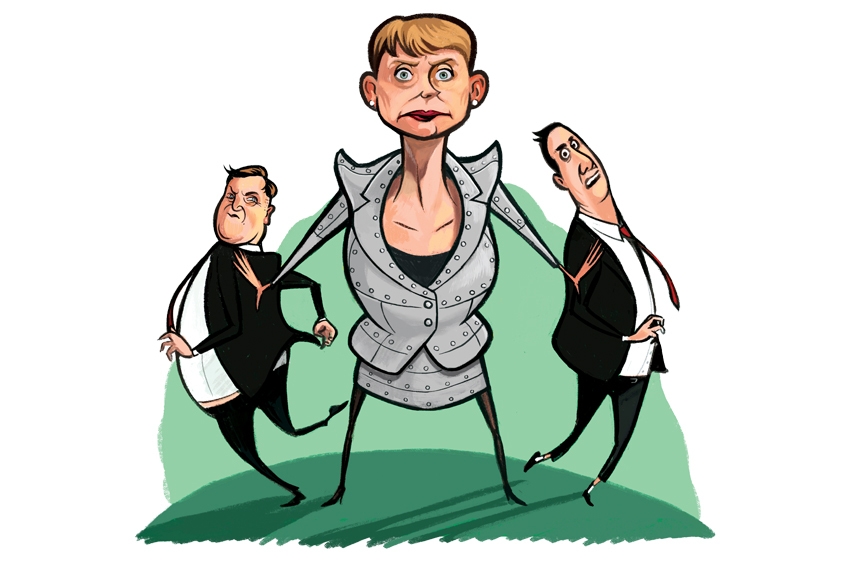In Yvette Cooper’s home, an entire room is given over to memorabilia of her husband’s life in politics. Pictures of Ed Balls hang on the walls and the room is kitted out with phone lines and computers so it can function as a nerve-centre for the shadow chancellor while he is working from home. Cooper’s office is a snug under the stairs. Anyone visiting might imagine that this was the home of a great political genius, dutifully supported by a mother of three. There is no indication that this impish, unassuming woman is herself now the bookmakers’ favourite to lead Labour into the next election.
With Ed Miliband’s ratings down to a level from which no opposition leader has ever recovered, even the trade unionists who voted him in are beginning to give up hope. Attention is turning to the question of who Labour might have in reserve. Possible candidates include Chuka Umunna, the modish, shaven-headed MP for Streatham, and Dan Jarvis, the rather dashing MP for Barnsley, who is a former Paratrooper with an MBE. The ex-chancellor Alistair Darling is being spoken of as a caretaker candidate, who might be asked to tackle Alex Salmond, then save the Labour party as an encore. David Miliband, gor bless him, has still not given up hope. But for a variety of reasons, Cooper is seen as the candidate to beat.
Even her ferociously ambitious husband seems to agree. When asked last September if he still wanted to lead his party, Balls replied simply ‘no’. When he was then asked if he would back Cooper if she stood, he said: ‘Of course.’ Some saw this as the shadow chancellor preparing to stand aside for his wife. Others say that Cooper knows her husband has coveted the top job most of his life, and would never thwart his ambition. But not so long ago, it was said that Ed Miliband would never do such a thing to his brother. And doesn’t Labour believe that the wives of powerful men can indeed have it all?
There are rumours that, just as Tony Blair and Gordon Brown struck a power-sharing deal at the Granita restaurant in Westminster, so Cooper and Balls did the same before the last Labour leadership contest — at a motorway service station where they had stopped for coffee en route to London from their Yorkshire constituencies. She decided that she should not run, and he should. Asked about this ‘Costa Coffee pact’, Cooper laughs and says only: ‘I’m a tea drinker.’
But if Balls decided not to stand this time in some sort of reciprocal arrangement in favour of his wife, her problems would not end there. ‘The difficulty for Yvette is that she would be seen as a puppet,’ says one party insider who knows the couple well. ‘Whatever Ed was doing in a shadow cabinet led by Yvette, he would be seen as the power behind the throne. And that is a major problem for her. That is the thing that would stop her being elected.’ Friends say Cooper, 42, lacks the moth-to-the-flame ambition of her husband. As a child, far from reading Hansard under the bedcovers, she dreamt of being a tap dancer. (The couple are now jive enthusiasts, and can break into a snazzy dance routine at parties.)
Unlike her privately educated husband, Cooper is from solid Labour stock. Her father, Tony, was general secretary of a trade union, the Engineers’ and Managers’ Association, and her mother, a maths teacher, came from a mining family. She was born in Inverness, brought up in Hampshire and educated at state schools, including Alton College, where she studied for six A-levels while starring in the school production of Romeo and Juliet. She read philosophy, politics and economics at Balliol college, Oxford, graduating with a first, then spent a year at Harvard as a Kennedy scholar before returning to Britain to join the office of the then shadow chancellor, John Smith.
While working in Westminster she shared a flat with another young Labour researcher, Ed Miliband, whom she had met at Oxford. A stint working on Bill Clinton’s presidential campaign in Arkansas in 1992 completed her impeccable New Labourite credentials. It was while working for Harriet Harman on the social security brief (she was the architect of the New Deal policy for the unemployed) that she became romantically involved with Balls, then a young aide to Gordon Brown. Harman was not a fan of Balls and continually complained about him to her charge. She remembers ringing Cooper’s house one day only to have Balls answering the phone. ‘I had to quickly revise all the things I had been saying about Ed to Yvette.’
It was also around this time that Cooper collapsed with chronic fatigue syndrome after a bout of flu. She couldn’t walk as far as the underground station, she said later, without succumbing to exhaustion. It took her a year to get back on her feet. Unable to concentrate on anything intellectual, she became addicted to television soaps: ‘Nothing but Richard and Judy and trashy magazines to fill my day.’ But by 1995 she was fighting fit, and took a job as an opinion writer at the Independent. When the safe seat of Pontefract became vacant just five weeks before the 1997 general election, she beat Derek Scott, Tony Blair’s economic adviser, and Hilary Benn to the seat after putting down the microphone and walking into the audience to take questions.
Cooper defies the stereotype of the New Labour career woman fixated with politics and power. She became the first minister to take maternity leave, and even now is happy doing more than her share of domestic chores. Friends say her husband rules the roost. ‘Ed does the cooking but that’s about it. In everything else she defers to him. If anything needs doing with the children she does it,’ says one friend. ‘He dominates.’
When I interviewed her shortly after she became Chief Secretary to the Treasury two years ago — the first woman to hold the post — there were dolls and children’s backpacks scattered all over her office. ‘Oh yes, sorry about that, it’s ballet tonight,’ she said, apparently genuinely embarrassed. She had evidently not registered that juggling the public finances and the children’s after-school activities might be a selling point. She seems to have little interest in the exhibitionist aspect of the political game.
Cooper’s friends say she has something reassuringly mumsy about her. With Labour’s claim to economic competence all but terminally damaged, the theory of her backers is that she might convince the country she can balance the books with a plain-speaking approach not unlike a certain other young housewife who once turned political prejudices on their head.
The comparisons to Thatcher — inevitable when considering a prospective female leader — are seen by her detractors as ridiculous. Cooper may be an ‘Iron Lady’ but only in the sense that she is a lady in politics who is not a total push-over. ‘How would I describe her? Shrill. Shrill. Shrill,’ said one Cabinet minister. ‘Her political views seem to have been formed in 1980 and 1982 and not changed since. She gets wound up very easily in the Commons, although she is quite pleasant afterwards. More so than her husband, which isn’t saying much.’ ‘She’s ghastly, a typical nanny state-ish member of the Labour wimmen’s brigade,’ adds another Tory. When she was housing minister, she brought in the much-derided home information packs or ‘Hips’. Even Ruth Kelly was keen to jettison them when she took over the brief. And those who have worked with Cooper add that she has none of Thatcher’s decisiveness.
But another Tory minister, who has had both Cooper and Balls as opposite numbers, says she is the more formidable opponent, both in intelligence and in political subtl ety. Also — unlike Balls — she doesn’t feel the need to fight regardless of the merits of the case. And many Tory MPs worry privately that this plucky woman might discombobulate David Cameron across the dispatch box, especially since the Prime Minister is so anxious not to be seen as misogynist. He slipped up badly last year when he told Angela Eagle to ‘calm down, dear’ and when he told Nadine Dorries, a single mother, that she was ‘frustrated’. He would be hard put to handle a female Labour leader without appearing patronising, or — worse — a bully.
Cooper’s intelligence is beyond doubt. Like her husband, she has a firm grasp of figures and skewers opponents by conjuring up the right statistic. Whether this is an asset or not depends on how wonkish you like your politicians. She has been variously described as ‘steely and determined’ and ‘cold and zombie-like’. She is tarred as a Brownite, due mainly to her marriage. But to her credit, she managed to avoid the worst animosity of the Blair-Brown feuding by steering clear of the briefing wars.
Her refusal to be a backroom dealer like her husband is probably why she remains so popular among her colleagues. Under Labour’s curious system for choosing shadow cabinet members, all of their 258 MPs voted for colleagues to elevate to the front bench. Cooper came top with 232 votes, 40 votes ahead of the next-most-popular candidate (John Healey) and a good 53 votes ahead of her husband. ‘He’s getting used to being third place in elections,’ she said afterwards, referring rather mischievously to his dismal showing in the leadership election. The question remains as to whether she wants to see if she can do any better.
Labour has never deposed a leader. But then again, as a keen student of political history, Ed Miliband will be agonisingly aware that the only opposition leaders ever to suffer worse poll ratings than him are Iain Duncan Smith and Michael Foot. Should he decide to walk the plank, he may well do so the year before an election — Labour strategists are intrigued at how Kevin Rudd became leader of Australia’s Labour party with just a year to go before fighting, and winning, the general election.
With the party fearing that it may soon be rudderless, this is not the first time that Cooper has been talked up as Labour’s Iron Lady. But it is the first time that she has been so clearly marked out as the front-runner. She opted out of the 2010 race with a clear hint that she may be back when her children were old enough. ‘I could be working for another 25 years,’ she said. ‘And I’m only likely to be reading bedtime stories for another two or three years.’ Well, those two or three years are nearly up.







Comments